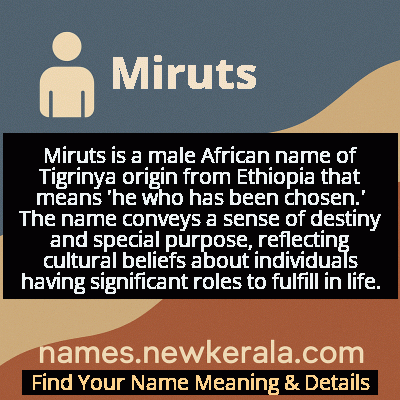Miruts Name Meaning & Details
Origin, Popularity, Numerology Analysis & Name Meaning of Miruts
Discover the origin, meaning, and cultural significance of the name MIRUTS. Delve into its historical roots and explore the lasting impact it has had on communities and traditions.
Name
Miruts
Gender
Male
Origin
African
Lucky Number
1
Meaning of the Name - Miruts
Miruts is a male African name of Tigrinya origin from Ethiopia that means 'he who has been chosen.' The name conveys a sense of destiny and special purpose, reflecting cultural beliefs about individuals having significant roles to fulfill in life.
Miruts - Complete Numerology Analysis
Your Numerology Number
Based on Pythagorean Numerology System
Ruling Planet
Sun
Positive Nature
Leaders, ambitious, highly driven, self-reliant, innovative.
Negative Traits
Overly aggressive, domineering, impatient, selfish.
Lucky Colours
Red, orange, gold.
Lucky Days
Sunday.
Lucky Stones
Ruby, garnet.
Harmony Numbers
2, 3, 9.
Best Suited Professions
Entrepreneurs, managers, engineers.
What People Like About You
Courage, determination, leadership.
Famous People Named Miruts
Miruts Yifter
Olympic Athlete
Double gold medalist in 5,000m and 10,000m at 1980 Moscow Olympics
Miruts Haile
Military Leader
Prominent Ethiopian military commander during civil war period
Miruts Berhe
Academic Researcher
Notable scholar in Horn of Africa political and social studies
Name Variations & International Equivalents
Click on blue names to explore their detailed meanings. Gray names with will be available soon.
Cultural & Historical Significance
The historical context of the name is rooted in societies where community values and collective identity are paramount. Giving a child the name Miruts represents the family's hopes for their child's future and their belief in that child's potential to achieve great things. This naming tradition reinforces cultural continuity and the transmission of values across generations. The name also embodies the Ethiopian concept of 'serat' or destiny, where individuals are believed to have predetermined paths that they must discover and fulfill, making Miruts a name that carries both honor and expectation.
Extended Personality Analysis
Individuals named Miruts are typically characterized by a strong sense of purpose and natural leadership qualities that align with the name's meaning of being chosen. They often exhibit confidence, determination, and a clear vision for their goals, combined with the resilience to overcome obstacles. This sense of destiny frequently manifests as strategic thinking and careful planning, allowing them to navigate complex situations with wisdom and foresight. Their inherent belief in their capabilities often inspires others to follow their lead, making them effective in positions of responsibility.
Beyond their leadership qualities, those named Miruts often display deep loyalty to their principles and communities, balancing ambition with a sense of duty. They tend to be reflective individuals who consider the broader implications of their actions, showing maturity beyond their years. While they carry themselves with authority, they typically combine this with compassion and understanding, recognizing that true leadership involves serving others. The combination of strong will and empathetic understanding makes Miruts individuals respected figures in their personal and professional circles, often becoming mentors and guides to those around them.
Modern Usage & Popularity
In modern times, Miruts continues to be used within Ethiopian and Eritrean communities as a meaningful traditional name, though its usage patterns have evolved. While it remains less common than some other traditional names, it maintains its cultural prestige and is often chosen by families seeking to honor their heritage and convey specific values to their children. The name has gained some international recognition through prominent bearers like Olympic champion Miruts Yifter, which has helped preserve its usage in diaspora communities. Contemporary parents who choose this name often do so to emphasize qualities of leadership, purpose, and distinction, seeing it as a meaningful connection to cultural roots while fitting into global naming trends that value significant meanings. Its usage remains steady rather than trending, reflecting its status as a classic, meaningful choice rather than a fashionable one.
Symbolic & Spiritual Meanings
Symbolically, Miruts represents the profound concept of divine selection and purposeful destiny that transcends its literal meaning. The name embodies the intersection of human potential and perceived cosmic design, suggesting that some individuals carry special purposes or destinies that benefit their communities. It symbolizes the belief that human lives are not random but are part of a larger tapestry of meaning and purpose. In metaphorical terms, Miruts represents the seed of greatness that requires cultivation through character, effort, and wisdom to fully blossom. The name also carries symbolic weight in representing cultural continuity and the transmission of values across generations, serving as a living connection to ancestral wisdom and community aspirations. It stands as a reminder that names can shape identity and that being 'chosen' carries both privilege and responsibility in one's journey through life.

